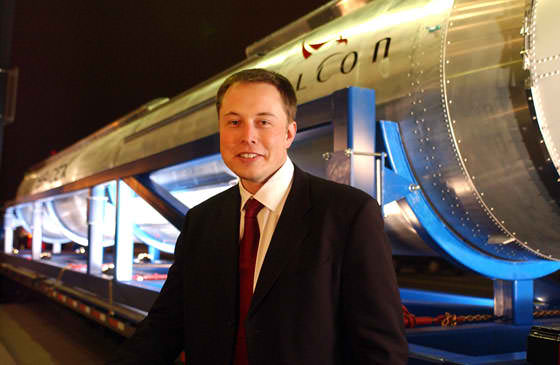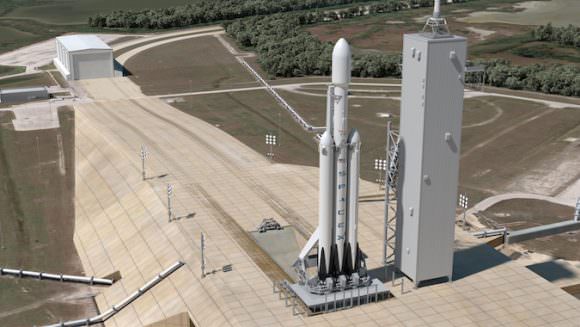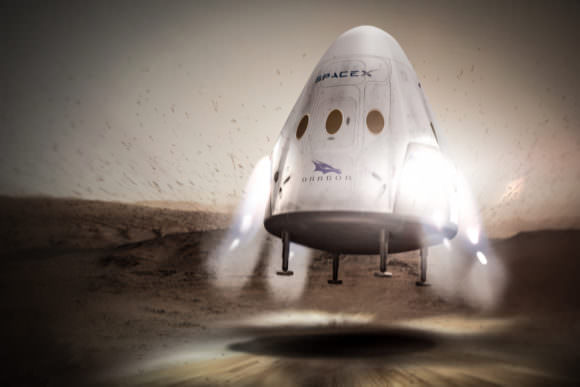I don’t know about you, but I’d like to live forever. In a few decades, the Singularity will happen, and I’ll merge with the artificial super intelligence, transcend this meat-based existence and then explore the Hubble Sphere with the disembodied voice of Scarlett Johansson as my guide. See you on the other side, suckers.
Not Elon Musk, though. He thinks we should fear our benevolent computer overlords, and make our way to Mars, where we can live out the rest of our days growing potatoes, huddling in lava tubes, and fighting a guerilla war against a spiritually enlightened and lovable artificial lifeform that really only has our best interests at heart.
In case you have no idea who I’m talking about, Elon Musk is the CEO of the revolutionary rocket company SpaceX, as well as the Tesla electric car company.

It might sound crazy, but the whole reason Elon Musk started SpaceX was that he wanted to help humanity explore the Solar System. But in order to do that, he’d need inexpensive rocket launches. And since those didn’t exist yet, he started a rocket company to provide launches at a fraction of the cost of the existing launch providers.
At the time I’m recording this video, SpaceX has already had many successful launches. They’ve successfully landed rockets back at their landing pad, and on a floating barge in the Atlantic Ocean. It really looks like Elon Musk’s plans are going to work, and we’re going to become a true spacefaring civilization.
Elon Musk recently revealed the design for what he calls the Interplanetary Transport System (ITS) – an upgraded version of his Mars Colonial Transporter (MCT). This ship, according to Musk, will ferry 100 passengers to Mars every 26 months (when the planets are closest), and says that tickets will cost $500,000 per person (at least initially).
Wow, 2024, huh? That’s pretty soon! I’m not sure if you realize how complicated and dangerous this mission will be. This guy is really serious.

The plan involves using a scaled up version of SpaceX’s Falcon rocket, known as the Falcon Heavy, to test techniques for orbiting, descent, and landing on Mars. By bolting 3 Falcon boosters together, this new launch vehicle will be capable of blasting 54,000 kilograms into orbit, or 22,000 kilograms to geostationary orbit, or 13,900 kilograms to Mars.
It’ll even send 2,600 kilograms to Pluto, if that’s what you’re looking for. So far a Falcon Heavy hasn’t been tested yet, but they’re due to start flying by early 2017.
The spacecraft payload is known as the Red Dragon, an uncrewed version of the Dragon 2 which Musk plans to send to Mars in 2018. This is a specially modified version of the SpaceX Dragon capsule which has already successfully delivered cargo to the International Space Station.
Red Dragon will weigh 10 times more than NASA’s Curiosity Rover, and this is a big problem. Landing this much spacecraft on the surface on Mars is incredibly challenging. The atmosphere is just 1% the thickness of Earth’s, so it doesn’t provide any way to slow a spacecraft down from its interplanetary flight.
In the past, rocket engineers have had to develop these complicated landing systems with parachutes, airbags, and retrorockets. But there’s limit to how heavy a mass you can land this way. Curiosity pretty much tested that limit.

Red Dragon makes it simple. It’ll be equipped with 8 SuperDraco engines built into the capsule which will fire once it enters the atmosphere, and allow it to touch down gently on the surface of Mars. If this works, there’ll be no limit to the size of payloads SpaceX can deploy to the surface of Mars. In fact, once it gets Mars right, Red Dragon should be able to land softly on pretty much any object in the Solar System.
Elon Musk does seem serious about setting up a colony on Mars. Once this first Red Dragon land on the surface, they’ll send capsule after capsule during the perfect Mars launch window that opens up every 2 years or so.
Over time, a real colony’s worth of supplies will be gathered on the surface of Mars. SpaceX will have worked out all the tricks to safely sending spacecraft to the Red Planet, and it’ll be time to send actual colonists willing to live out the rest of their lives on Mars.
We’re still not entirely sure humans can survive long term on Mars. The lack of atmosphere will suffocate you, the unfiltered radiation will fill you with cancer, and the low gravity may melt your bones. Seriously, humanity has never tried living in such an extreme environment.
Musk is so serious about this plan to send humans to Mars, that he’s stated that he’ll never take SpaceX public. The company will remain private so that it’ll prioritize the goal of colonizing Mars over any kind of short sighted shareholder cash grab.
If everything goes well, the first Red Dragon will launch for Mars in 2018. And then more will go every 2 years after that. And at some point, humans will climb into a Red Dragon capsule and blast off to begin the first human colony on Mars.
So when can we die on Mars? Musk hasn’t given us a firm date yet, but if that first Red Dragon does launch in 2018, we won’t have to wait too much longer.


The video does not play:
AN ERROR HAS OCCURRED.
Please try again later:
Playback ID 0fJKfEcwc0F0V5c <- Not sure what that means?
I did try to refreshing a few times to only get the same error.
I guess it got embedded incorrectly somehow. It seems to be working fine on Youtube:
https://www.youtube.com/watch?v=bYfgvyxvPnc
Edit: Lawl, it embedded the video in this message
For some reason, this specific video didn’t like being embedded. Very strange. Computers are weird.
This opens a question: If people are willing to die on Mars, will their bodies decompose? And is there any science that can be gained by this process? One of the biggest building blocks for life on Earth is micro-organisms. It is also one of the biggest factors to decomposition. So far, we have not found any on Mars. So could us importing the natural life cycle to Mars become what kick starts the Martian biosphere?
If you die in a biosphere like the one you lived in, you will decompose, because the essential bacteria are already in us, but if we are outside, we will be preserved, although in the very low presure we might not die pretty. As for terraforming … if our bacteria were to survive, they wouldn’t thrive. Over the course of millions of years there is an outside posibility that they could start producing methane and oxygen faster than they are depleted … but odds are totally against it. Even with a thick atmosphere single cell life took until about 800 million years ago to come close to terraforming earth.
Will Elon Musk actually colonize Mars like he dreams? I have no idea but dammit, the very thought someone of his stature is thinking about is exciting. I’m a fan of both Bill Nye and Dr. Tyson but on several occasions they have outright ridiculed the idea on the Star Talk podcast show they both share.
Colonizing Mars may not be possible in the long run but at least someone dreaming the big dreams that could push human civilization to a new level. Frankly I’m tired of hearing all the doom and gloom the media and our politicians put out to the general population. Our nation once had big dreams, now we seem just to be waiting for the end of the world.
“We’re still not entirely sure humans can survive long term on Mars. The lack of atmosphere will suffocate you, the unfiltered radiation will fill you with cancer, and the low gravity may melt your bones.”
That is incorrect. By every metric (including the three you listed in the article, radiation, gravity, pressure) LEO is a more inhospitable environment than Mars ever could be. LEO features lower gravity, lower pressure, and higher radiation doses than anywhere on the surface of Mars. And yet we have been successfully living in LEO continuously for +15 years. Yes, keeping people resupplied over interplanetary distances is much harder than keeping them resupplied in LEO, but that is a question of logistics, not fundamental feasibility. It has nothing to do with the basic question of whether or not humans can live on the surface of Mars. The answer to that question is a simple “Yes, we can.”
We’ve kept astronauts in space for up to a year at a time, but then we bring them back to Earth to recover. I think the radiation and pressure are solvable problems – stay inside, under rock for protection. But we just don’t know what 30% gravity does to a human over a long period. We know microgravity is really really unhealthy.
Whatever 30% gravity does to a human over a long period, there is absolutely no reason to believe it would be worse than what 0% gravity does over a long period. We agree then that LEO is a corner case for basically every environmental hazard humans would be exposed to while living on the surface of Mars (assuming sufficient controls can be implemented to solve the perchlorate issue).
That is why I object to the characterization in this article of Mars as a bone melting, suffocating, cancer giving pool of radiation that is more hostile than anywhere we have ever explored. It just isn’t. By any of those metrics, LEO is a far more challenging environment. There are real challenges standing in the way of getting humans to Mars. Let’s not obstruct the road with fabricated ones.
So when did Musk ever state he was fearful of AI and the Singularity? Everything he is working on is definitely revolutionary, but is completely separate from the AI evolution… I think accurately representing the views of people as noteworthy as Musk is very important…
Movie references… It’s called, “Humor”. Look it up. People that are aware of it, know these are jokes.
I understand that you were expressing it as humor… I guess I was trying to be sensitive to the fact that the fully realized expression of AI is literally around the corner, yet the global community is still grappling with ingrained fears and misperceptions surrounding the issue…. I have the understanding that AI will effect all of us profoundly and that disinformation or Internet articles taken out of context can have a damaging impact on the shocked populace at large. I guess I should worry less and appreciate more and laugh at your humor. My apologies
When I’m not making jokes about AI, I’m personally very interested (and mildly alarmed) at the potential of artificial super intelligence. And so is Elon Musk.
http://www.wired.com/2015/12/elon-musks-billion-dollar-ai-plan-is-about-far-more-than-saving-the-world/
I’d like to visit and gaze down at Valles Marineris and up at Olympus mons and I’d like to be buried there but I wouldn’t want to live there.
Yeah, I’d be happy to visit, but then I’d like to come back to Earth.